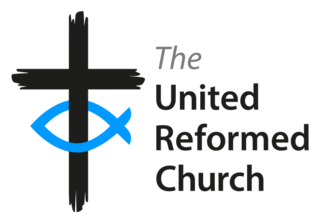Related Research Articles

The Christian Church (Disciples of Christ) is a mainline Protestant Christian denomination in the United States and Canada. The denomination started with the Restoration Movement during the Second Great Awakening, first existing during the 19th century as a loose association of churches working towards Christian unity, then slowly forming quasi-denominational structures through missionary societies, regional associations, and an international convention. In 1968, the Disciples of Christ officially adopted a denominational structure at which time a group of churches left to remain nondenominational.

Presbyterianism is a part of the Reformed (Calvinist) tradition within Protestantism that broke from the Roman Catholic Church. Presbyterian churches derive their name from the presbyterian form of church government by representative assemblies of elders. Many Reformed churches are organised this way, but the word Presbyterian, when capitalized, is often applied to churches that trace their roots to the Church of Scotland or to English Dissenter groups that formed during the English Civil War.

The United Reformed Church (URC) is a Protestant Christian church in the United Kingdom. As of 2022 it had approximately 40,000 members in 1,284 congregations with 334 stipendiary ministers.

Congregational churches are Protestant churches in the Reformed (Calvinist) tradition practicing congregationalist church governance, in which each congregation independently and autonomously runs its own affairs.
The Confessing Movement is a largely lay-led theologically conservative Christian movement that opposes the influence of theological liberalism and theological progressivism currently within several mainline Protestant denominations and seeks to return them to its view of orthodox doctrine, or form a new denomination and disfellowship (excommunicate) them if the situation becomes untenable. Those who eventually deem dealing with theological liberalism and theological progressivism within their churches and denominations as not being tenable anymore would later join or start Confessional Churches and/or Evangelical Churches that continue with the traditions of their respective denominations and maintaining orthodox doctrine while being ecclesiastically separate from the Mainline Protestant denominations.

A united church, also called a uniting church, is a denomination formed from the merger or other form of church union of two or more different Protestant Christian denominations, a number of which come from separate and distinct denominational orientations or traditions. Multi-denominationalism, or a multi-denominational church or organization, is a congregation or organization that is affiliated with two or more Christian denominations, whether they be part of the same tradition or from separate and distinct traditions.
The Congregational Christian Churches were a Protestant Christian denomination that operated in the U.S. from 1931 through 1957. On the latter date, most of its churches joined the Evangelical and Reformed Church in a merger to become the United Church of Christ. Others created the National Association of Congregational Christian Churches or joined the Conservative Congregational Christian Conference that formed earlier in 1945. During the forementioned period, its churches were organized nationally into a General Council, with parallel state conferences, sectional associations, and missionary instrumentalities. Congregations, however, retained their local autonomy and these groups were legally separate from the congregations.

The Presbyterian Church in the United States of America (PCUSA) was a Presbyterian denomination existing from 1789 to 1958. In that year, the PCUSA merged with the United Presbyterian Church of North America. The new church was named the United Presbyterian Church in the United States of America. It was a predecessor to the contemporary Presbyterian Church (USA).
The World Alliance of Reformed Churches (WARC) was a fellowship of more than 200 churches with roots in the 16th century Reformation, and particularly in the theology of John Calvin. Its headquarters was in Geneva, Switzerland. They merged with the Reformed Ecumenical Council in 2010 to form the World Communion of Reformed Churches.
The Evangelical and Reformed Church (E&R) was a Protestant Christian denomination in the United States. It was formed in 1934 by the merger of the Reformed Church in the United States (RCUS) with the Evangelical Synod of North America (ESNA). A minority within the RCUS remained out of the merger in order to continue the name Reformed Church in the United States. In 1957, the Evangelical and Reformed Church merged with the majority of the Congregational Christian Churches (CC) to form the United Church of Christ (UCC).
The United Congregational Church of Southern Africa (UCCSA) is a prominent Christian denomination established in 1967, following the unification of various congregational movements within Southern Africa. Its origins can be traced back to the missionary work of the London Missionary Society in the Cape Colony in 1799. The UCCSA plays a significant role in the religious landscape of Southern Africa, with a membership of approximately 500,000. It maintains a notable presence in countries such as South Africa, Mozambique, Botswana, Zimbabwe, and Namibia. The UCCSA is recognized for its contributions to education and social justice in the region.

The World Communion of Reformed Churches (WCRC) is the largest association of Reformed (Calvinist) churches in the world. It has 230 member denominations in 108 countries, together claiming an estimated 80 million people, thus being the fourth-largest Christian communion in the world after the Catholic Church, Eastern Orthodox Church, and the Anglican Communion. This ecumenical Christian body was formed in June 2010 by the union of the World Alliance of Reformed Churches (WARC) and the Reformed Ecumenical Council (REC).
The United Church of Christ – Congregational in the Marshall Islands (UCCCMI) is a Protestant Christian church in the Marshall Islands. With approximately 40,000 members, the UCCCMI is the largest religious group in the Marshall Islands, accounting for about 55 percent of the population.

The Indonesian Christian Church is an Indonesian church of Presbyterian denomination. It adheres to Calvinist theology.

The Reformed Presbyterian Church of North America (RPCNA) is a Presbyterian church with congregations and missions throughout the United States, Canada, Japan, and Chile. Its beliefs—held in common with other members of the Reformed Presbyterian Global Alliance—place it in the conservative wing of the Reformed family of Protestant churches. Below the Bible—which is held as divinely inspired and without error—the church is committed to several "subordinate standards," together considered with its constitution: the Westminster Confession of Faith and Larger and Shorter Catechisms, along with its Testimony, Directory for Church Government, the Book of Discipline, and Directory for Worship.

The United Church of Christ in the Philippines is a Christian denomination in the Philippines. Established in its present form in Malate, Manila, it resulted from the merger of the Evangelical Church of the Philippines, the Philippine Methodist Church, the Disciples of Christ, the United Evangelical Church and several independent congregations.
The Presbyterian Church of the Philippines (PCP), officially The General Assembly of the Presbyterian Church of the Philippines, is a growing evangelical, Bible-based Reformed church in the Philippines. It was officially founded in 1987 and the General Assembly was organized in September 1996.
References
- 1 2 "United Church in Jamaica and the Cayman Islands — World Council of Churches". Oikoumene.org. January 1967. Retrieved 2013-04-26.
- ↑ www.wcrc.ch/node/164 Archived August 8, 2012, at the Wayback Machine